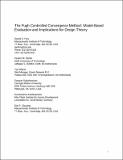The Pugh Controlled Convergence Method: Model-Based Evaluation and Implications for Design Theory
Author(s)
Wijnia, Ype; Clausing, Don P.; Herder, Paulien M.; Katsikopoulos, Konstantinos; Subrahmanian, Eswaran; Frey, Daniel; ... Show more Show less
DownloadFrey_Pugh controlled.pdf (810.5Kb)
PUBLISHER_POLICY
Publisher Policy
Article is made available in accordance with the publisher's policy and may be subject to US copyright law. Please refer to the publisher's site for terms of use.
Terms of use
Metadata
Show full item recordAbstract
This paper evaluates the Pugh Controlled Convergence method and its relationship to recent developments in design theory. Computer executable models are proposed simulating a team of people involved in iterated cycles of evaluation, ideation, and investigation. The models suggest that: 1) convergence of the set of design concepts is facilitated by the selection of a strong datum concept; 2) iterated use of an evaluation matrix can facilitate convergence of expert opinion, especially if used to plan investigations conducted between matrix runs; and 3) ideation stimulated by the Pugh matrices can provide large benefits both by improving the set of alternatives and by facilitating convergence. As a basis of comparison, alternatives to Pugh's methods were assessed such as using a single summary criterion or using a Borda count. These models suggest that Pugh's method, under a substantial range of assumptions, results in better design outcomes than those from these alternative procedures.
Date issued
2009-03Department
Massachusetts Institute of Technology. Department of Mechanical EngineeringJournal
Research in Engineering Design
Publisher
Springer London
Citation
D. Frey, P. Herder, Y. Wijnia, E. Subrahmanian, K. Katsikopoulos, and D. Clausing, “The Pugh Controlled Convergence method: model-based evaluation and implications for design theory,” Research in Engineering Design, vol. 20, Mar. 2009, pp. 41-58.
Version: Author's final manuscript
ISSN
1435-6066
0934-9839
Keywords
decision analysis, multi-criteria decision-making, concept selection, comparative judgment